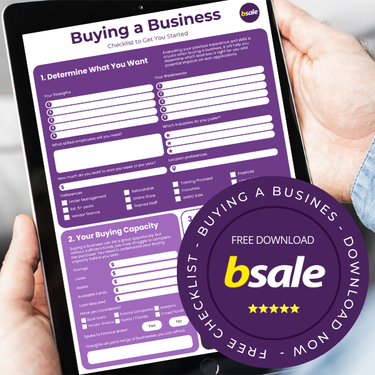Buying a Business in Australia: A Comprehensive Guide

Comprehensive Guide by Bsale
Buying a business is exciting, but before you start enquiring on businesses for sale, it's important you understand the entire process if you want to be successful.
Whether you are a first-time buyer or have purchased a business before it's a good idea to check up on the latest procedures and what to expect during the process.
Two of the biggest hurdles when people look to buy a business are securing finance and properly undergoing due diligence. We take the confusion out of buying a business and how to avoid issues to increase your chances of a successful purchase. With over 14,000 businesses for sale, there are a lot of opportunities on the market for buyers.
This guide will help you understand how to buy a business and what professionals can assist you along the way.
10 Steps to Buying a Business:
1. Determine What Type of Business to Buy
2. Understand Your Buying Capacity
3. Search for Business Opportunities
4. Make Enquiries and Sign NDA
5. Review Information Memorandum
6. Make an Offer
7. Conduct Due Diligence
8. Secure Funds to Buy the Business
9. Negotiations
10. Settlement and Transfer


1. Determine What Type of Business to Buy
Before you take the step to start enquiring about businesses for sale, it’s essential to self-assess and determine if you have the abilities to run a business and identify what type of business is right for you. Buying a business has many advantages over starting from scratch, and there are number of government resources to help guide you.
Evaluating your previous experience and skills is crucial when considering buying a business. For instance, if you have no experience working in a cafe, it might not be wise to invest in one until you have had the opportunity to understand how a successful cafe operates. Similarly, if you lack experience in business management, it’s advisable to undertake some training, such as this Small Business Management course.
Before you start looking at businesses to buy, it’s a good idea to evaluate your situation to determine which business best suits your circumstances. We have put together a buyers checklist to assist you. This checklist will help you uncover:
- Your Strengths
- Your Weaknesses
- Who you may need to hire with specific skills (e.g. if buying a cafe, you may need to hire a barrista or chef)
- What type of businesses suits your skills and background
- How much money you have or will need to borrow
- What do you want you weekly pay to be
- How much are you willing to invest
- Location requirements
- Short-list businesses for sale that meet criteria

2. Understand Your Buying Capacity
Buying a business can be a great opportunity, but without sufficient funds, you will struggle to complete the purchase.
Many buyers make the mistake of worrying about financing after they find a business they want to buy, which can lead to disappointment for both the buyer and seller. Understanding your financial situation before starting the journey to buying a business is crucial.
It's important to have a clear understanding of your borrowing capacity, as business loans depend not only on the business itself but also on your personal assets and circumstances. When buying a business, you may need separate loans for different parts of the purchase, such as a loan to buy the business and another to purchase assets or equipment.
Securing a loan from a major lender can be challenging as they evaluate both your financial position and the business you want to buy. However, there are various financing options available to help you acquire a business.
Consider the following options and assess which ones apply to your situation, how much you might be able to obtain, and what your next steps should be once you find a business. Always consult with a finance broker experienced in commercial lending to explore the best financing options for you.
Here are 8 ways to finance the purchase of a business
-
Personal Savings
Utilising your own savings is often the most straightforward way to finance a business purchase. It avoids the need for external debt and demonstrates your commitment to the venture. Obviously depending on the size of the business you are buying and your personal circumstances, this may be a limited option. -
Bank Loans
Traditional banks and financial institutions offer business loans. To increase your chances of approval, prepare a comprehensive business plan, financial statements, and maintain a solid credit history. Buying a business usually requires at least 40% equity in the business, with most lenders not willing to go above 60% investment into a business purchase. So you will also need access to money to cover your equity share. In general, banks prefer to have collateral such as equipment, or real estate to help support the loan. -
Vendor Financing
This has become more common since 2020 and the COVID-19 lockdowns. Some business owners may be willing to finance a portion of the purchase price. This can have pros and cons so it is important to negotiate the terms, interest rates, and repayment schedule. -
Equity Investment
Obtain equity investment from venture capitalists, angel investors, or private equity firms. They provide the necessary capital in exchange for a share of ownership in your business. Obviously you will be involving more parties into the business so always get professional advice and clear understanding of each parties involvement. -
Crowdfunding
Consider using crowdfunding platforms to raise capital for your business purchase. Websites like Kickstarter and Indiegogo may be suitable for certain types of businesses. -
Family and Friends
Don't overlook borrowing from family or friends. Ensure to formalise the arrangement with a clear agreement and repayment terms to avoid personal conflicts. -
Asset-Based Financing
If the business you are buying has valuable assets, you may use these assets as collateral for a loan. Asset-based lending options include equipment financing or accounts receivable financing. Whilst this is a good optoin to cover part of the business purchase, it probably wont cover the entire purchase. -
Franchise Financing
If you're buying a franchise, the franchisor may offer financing options or connect you with preferred lenders experienced in franchise financing.

3. Search for Business Opportunities
Once you have completed the checklist and organised your finances you will know where you stand financially and what business you are looking to buy. The next step is to start searching for a business opportunity.
- Online Marketplaces
One of the most popular options is to look on businesses for sale websites like Bsale to find a business opportunity that meets your criteria. The businesses on these website are actively looking for buyers and have been prepared for sale. The opportunities may be listed with a business broker, franchise group or advertised privately. Filter by industry, location, and price to find suitable opportunities.
- Contact Businesses Directly
Not all business owners are actively advertising their sale, but they may be thinking about selling a business. You can approach a business that may be of interest to you and enquire if they are looking to sell. If you are considering this option, you need to be prepared to negotiate and understand the business may not be 'sale ready'.
- Business Brokers
There are 500+ business brokers working within Australia. Engage with business brokers in your area who can keep you informed of new opportunities and help you during the buying process.
- Networking
There are a number of local business networking groups and Facebook groups that could have active sellers. You could post what you are looking to buy and see if any business owners reach out to you.


4. Make Enquiries and Complete Non-Disclosure Agreement
When you find a business for sale that interests you, contact the seller to request more information. Most listings will include an enquiry form and contact details, such as a phone number.
Typically, sellers will ask you to sign a Non-Disclosure Agreement (NDA) to protect the confidentiality of the business information. This also helps to filter out fake enquiries and ensure that only genuinely interested buyers receive sensitive details. Complete the NDA and return it to the seller.

5. Review Business Information Memorandum
Typically, once the seller has received the signed NDA, they will provide you with an Information Memorandum (IM). The format of this document can vary between businesses, so some sellers may simply send you a collection of documents.
The Information Memorandum outlines key details about the business, including its operations, finances, and the seller's expectations. You may receive profit and loss statements and balance sheets. However, more sensitive information, such as tax returns and bank statements, may be withheld at this stage for privacy reasons. Sellers often reserve this information for serious buyers who have shown genuine interest and made a deposit.
Sellers are often cautious about revealing too much information early in the process to prevent sensitive details from being accessed by competitors. Therefore, the IM usually contains enough information for you to decide whether to proceed further without disclosing all critical details.
At this point, it is advisable to arrange a site visit and meet with the business owner. This will help you understand the business's operations and assess whether it is a good fit for you.

6. Make an Offer
Once you have reviewed the IM and met with the business owners its time to make an offer. Whilst it may seem premature to make an offer at this point without all the details of the business, it is a common practice in business sales.
Sellers are protective over their business information and usually won't release any further information without a deposit. In order to make a deposit you need to provide a written offer to the seller or their agent.
Once this offer is accepted, a deposit is usually required and a term sheet is established. This term sheet will outline the proposed price, payment terms, and any conditions of the sale. It will usually be dependent upon due diligence and securing finance.
It is important to obtain professional advice when submitting an offer, so you understand what options you have.

7. Conduct Due Diligence
As a buyer, conducting due diligence involves evaluating the business from multiple angles to determine if it meets your expectations. This is a critical phase where negotiations often occur.
It is important to establish a team of professional advisors who can help you review the business information and make an informed decision. It is a good idea to consult with an accountant, solicitor, business advisor, finance broker and business broker. They can assist you during the buying process, highlight any risks and provide professional advice.
Due diligence typically includes the following evaluations:
- Financial: Review profit and loss statements, balance sheets, salaries and wages, superannuation, tax obligations, and net profit to the owner.
- Operational: Assess customers, stock, website, marketing channels, suppliers, inventory, social media presence, employees, procedures, products and services, commercial premises lease, and plant and equipment leases and ownership.
- Legal: Verify the organisation's legal name and registrations, trademarks, patents, ATO liabilities, outstanding claims and court cases, legal matters, product warranties, service agreements, contracts, employee contracts, domain registrations, and distribution contracts.
- Market: Evaluate the market position, competition, and growth potential of the business.
By thoroughly examining these areas, you can make an informed decision about whether the business is a good decision for you.

8. Secure Funds to Buy Business
Whilst your team is assisting you to perform due diligence on the business, this is also the time to secure the funds needed to buy the business.
Ideally, in Step 2, you would have identified your buying capacity and the funds you have access to. If you are applying for loans, you will need to start the process alongside the due diligence period to ensure it is approved in a timely manner. As with most commercial loan applications, they will require you to prepare a business plan and forecast for loan repayments.


9. Negotiations
Once your team has reviewed the business during the due diligence phase there is a high chance you will come across items you want to include in the Contract of Sale or price adjustments to be made. A series of negotiations will occur between the buyer and seller, generally using a term sheet, until they come to an agreement.
Negotiations may include:
- The intent of each party, including their background.
- Terms of the sale and inclusions, such as inventory, training, and plant and equipment.
- Lease details and transferability.
- Pricing negotiations.
- What information is private and confidential.
- Conditions that must be met before settlement can occur.
- Specific clauses, such as a 'non-compete' or 'buy-out' agreement.
Depending on the solicitors involved and the value of the business being sold a term sheet or a heads of agreement (HOA) may be used during the negotiations. Once finalised, these documents will be used to draft a Contact of Sale that is prepared by the solicitor and issued to each party.
The draft Contract of Sale will be reviewed by each party and if accepted the final Contract of Sale will be created and issued.

10. Settlement and Transfer
Once the final Contract of Sale is issued and signed by all parties - the business sale is now binding!
As the buyer, you will need to make the payment according to the agreed terms. Ownership of the business will then be transferred to you. Depending on the Contract of Sale, there may be additional conditions such as a training period, buy-outs, or vendor financing.
Solicitors and accountants will assist with the transfer of business ownership to the relevant government bodies. The seller will be required to hand over important documents, logins, property access, and more. The previous owner may also provide training and support during the transition period.

Disclaimer: This information is intended as a general guide and should not be considered professional advice. Always consult with a licensed professional when buying a business.
Updated: May 21, 2024. Originally Published 2021
Tags: buying buying a business guide
About the author

Vanessa Lovie
CEO Bsale Australia
Vanessa is the current manager and CEO of Bsale Australia. Over the past 11 years as a business owner, she understands what it takes to grow a ...









